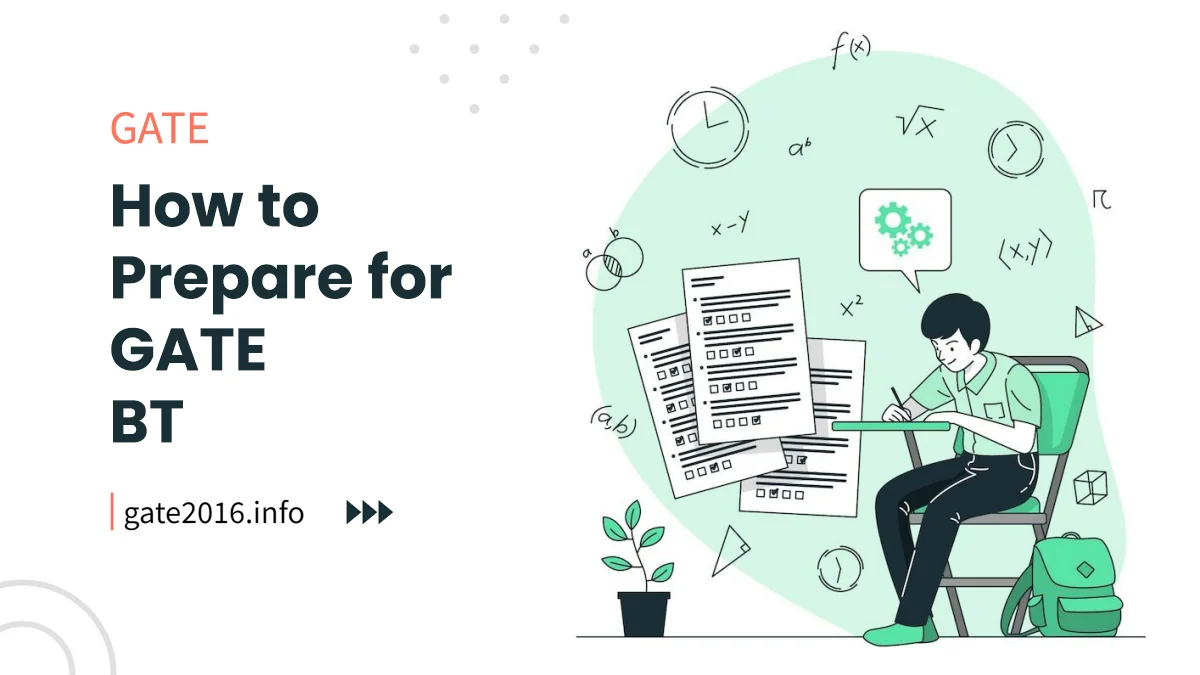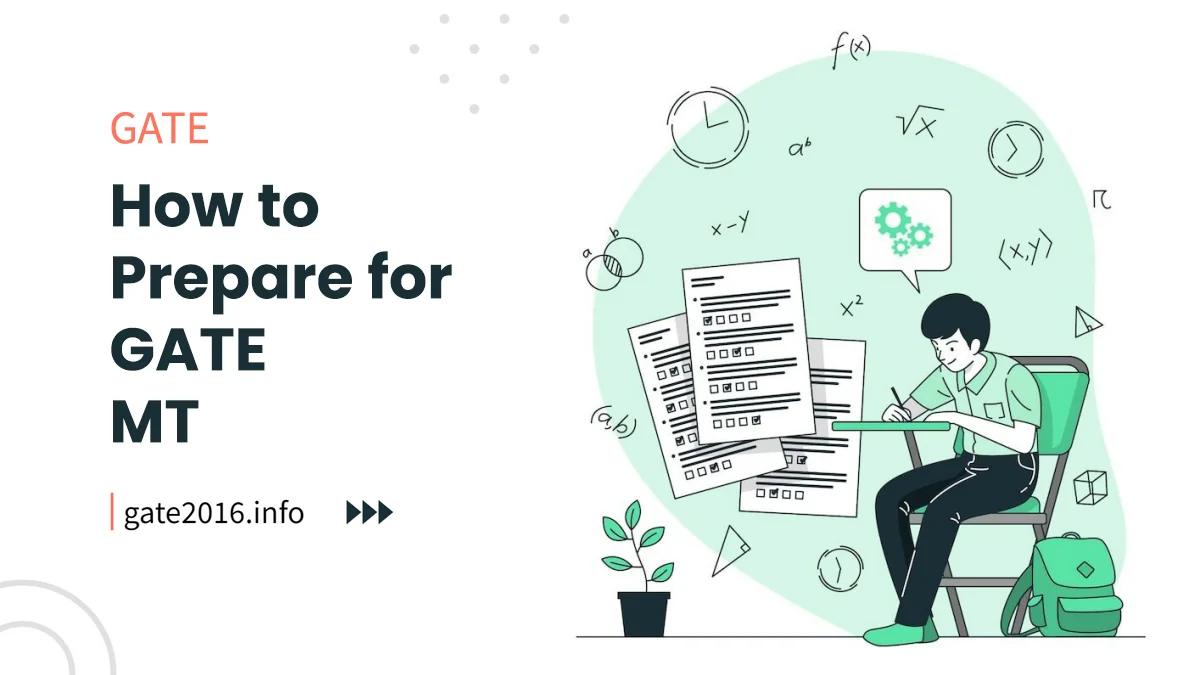Advertisements
Ratings

GATE 2024 BT Preparation – The Graduate Aptitude Test in Engineering (GATE) is a pivotal examination for aspiring biotechnology professionals seeking advanced education and career opportunities.
Success in GATE requires a strategic and comprehensive preparation plan.
In this guide, we provide a step-by-step approach to help you excel in the GATE Biotechnology examination.
Contents
- 1. Introduction to GATE Biotechnology
- 2. Understanding the GATE Biotechnology Syllabus
- 3. Crafting a Comprehensive Study Plan
- 4. Selection of Appropriate Study Materials
- 5. Mastering Fundamental Concepts
- 6. Solving Numerical and Conceptual Problems
- 7. Reviewing Previous Years’ Question Papers
- 8. Taking Mock Tests
- 9. Effective Time Management Strategies
- 10. Implementing Revision Techniques
- 11. Staying Updated with Biotechnology Advancements
- 12. Managing Exam Stress
- 13. Final Weeks’ Preparation Strategy
- 14. Approaching Exam Day Confidently
- 15. Reflecting on the Exam and Planning Ahead
- Conclusion: Excelling in GATE Biotechnology
- Additional Resources and References
- GATE Biotechnology Guidance
- GATE Biotechnology Preparation FAQs
- GATE Total Information & Guidance
1. Introduction to GATE Biotechnology
GATE Biotechnology is a gateway to specialized education and research opportunities in the field of biotechnology.
Effective preparation is key to achieving a competitive edge in this challenging exam.
2. Understanding the GATE Biotechnology Syllabus
The GATE Biotechnology syllabus encompasses a wide range of subjects essential for a thorough understanding of the field.
Here’s a breakdown of the syllabus into core subjects and key topics:
Table 1: GATE Biotechnology Syllabus Breakdown
| Subject | Key Topics |
|---|---|
| Engineering Mathematics | Linear algebra, Calculus, Differential equations, Probability and statistics |
| General Biotechnology | Basics of biology, Biochemistry, Molecular biology, Cell biology, Microbiology |
| Recombinant DNA Technology | DNA cloning, Gene expression, PCR, Restriction enzymes, Genomic library |
| Bioprocess Engineering | Fermentation, Mass transfer, Bioreactor design, Downstream processing |
| Microbiology | Microbial growth, Microbial metabolism, Industrial microbiology |
| Bioinformatics | Sequence alignment, Genomics, Proteomics, Systems biology |
3. Crafting a Comprehensive Study Plan
Creating a structured study plan is essential for effective GATE Biotechnology preparation.
Design a plan that covers all subjects and allocates time based on their weightage:
Table 2: Sample Study Plan
| Week | Subjects/Topics | Time Allocation |
|---|---|---|
| 1-2 | Engineering Mathematics | 10 hours/week |
| 3-4 | General Biotechnology | 12 hours/week |
| 5-6 | Recombinant DNA Technology | 15 hours/week |
| 7-8 | Bioprocess Engineering | 10 hours/week |
| 9-10 | Microbiology | 12 hours/week |
| 11-12 | Bioinformatics | 8 hours/week |
4. Selection of Appropriate Study Materials
Choosing the right study materials is crucial for comprehensive GATE Biotechnology preparation.
Consider a mix of textbooks, reference materials, online resources, and mock tests:
Table 3: Recommended Study Resources
| Subject | Books | Online Resources |
|---|---|---|
| Engineering Mathematics | “Advanced Engineering Mathematics” by Erwin Kreyszig | Khan Academy, Coursera Mathematics courses |
| General Biotechnology | “Molecular Biology of the Cell” by Alberts et al. | NPTEL’s Biology courses |
| Recombinant DNA Technology | “Principles of Gene Manipulation” by Primrose | Coursera’s Molecular Biology courses |
| Bioprocess Engineering | “Bioprocess Engineering Principles” by Doran | NPTEL’s Bioprocess Engineering courses |
| Microbiology | “Microbiology: An Introduction” by Tortora | Coursera’s Microbiology courses |
| Bioinformatics | “Bioinformatics Algorithms” by Compeau and Pevzner | NPTEL’s Bioinformatics courses |
5. Mastering Fundamental Concepts
Develop a strong foundation in core concepts to excel in GATE Biotechnology.
Focus on key principles within each subject:
Table 4: Mastering Core Concepts
| Subject | Key Concepts |
|---|---|
| General Biotechnology | Cell structure, Biomolecules, Enzymes, Cell signaling |
| Recombinant DNA Technology | Cloning techniques, PCR, Gene expression |
| Bioprocess Engineering | Fermentation processes, Bioreactor design |
| Microbiology | Microbial growth, Metabolism, Industrial applications |
| Bioinformatics | Sequence analysis, Structure prediction, Databases |
6. Solving Numerical and Conceptual Problems
Balancing numerical problem-solving skills with conceptual understanding is crucial. Practice problems related to:
- Bioprocess Engineering: Calculations of yield, reactor volumes, and mass transfer coefficients.
- Microbiology: Growth kinetics, microbial metabolism, and fermentation rates.
7. Reviewing Previous Years’ Question Papers
Solving past GATE Biotechnology papers provides valuable insights into question patterns, difficulty levels, and exam trends:
Table 5: Benefits of Solving Previous Years’ Papers
| Benefit | Description |
|---|---|
| Understand Question Types | Identify common question patterns and formats |
| Time Management | Practice completing the paper within time |
| Exam Pattern Familiarity | Get comfortable with GATE question patterns |
| Self-Assessment | Evaluate your preparation level and progress |
8. Taking Mock Tests
Taking mock tests under exam-like conditions is essential for building confidence and refining time management:
Table 6: Benefits of Taking Mock Tests
| Benefit | Description |
|---|---|
| Exam Simulation | Replicate the actual exam environment |
| Time Management Improvement | Practice allocating time to different sections |
| Confidence Building | Boost your confidence before the actual exam |
| Identifying Weak Areas | Identify areas needing further improvement |
9. Effective Time Management Strategies
Effective time management during the exam is critical. Develop a strategy to allocate time to different sections based on their weightage:
Table 7: Time Management Strategy
| Section | Recommended Time Allocation |
|---|---|
| Engineering Mathematics | 15 minutes |
| General Aptitude | 15 minutes |
| Subject-specific Sections | 75 minutes each |
10. Implementing Revision Techniques
Regular revision is essential for retaining information. Utilize structured techniques to reinforce your knowledge:
- Revision Schedule: Allocate time for revisiting key topics regularly.
- Concise Notes: Create summarized notes and flashcards for quick review.
11. Staying Updated with Biotechnology Advancements
Staying current with advancements is crucial:
- Follow Research Publications: Subscribe to biotechnology journals and research articles.
- Engage in Online Communities: Participate in biotechnology forums and discussions.
12. Managing Exam Stress
Effective stress management is vital for staying focused during preparation:
- Relaxation Techniques: Engage in mindfulness, meditation, and deep breathing.
- Balanced Routine: Maintain study, breaks, exercise, and relaxation.
13. Final Weeks’ Preparation Strategy
As the exam approaches, intensify revision of key topics:
- Focused Revision: Dedicate more time to challenging subjects.
- Additional Mock Tests: Simulate exam conditions with more practice tests.
14. Approaching Exam Day Confidently
On the exam day, stay composed:
- Read Instructions Carefully: Understand question patterns and instructions.
- Effective Time Allocation: Allocate time wisely to different sections.
15. Reflecting on the Exam and Planning Ahead
Evaluate performance and plan the next steps:
- Performance Analysis: Identify strengths and areas for improvement.
- Future Planning: Determine future areas of study and improvement.
Conclusion: Excelling in GATE Biotechnology
Preparing for GATE Biotechnology requires dedication, planning, and a structured approach.
By following this comprehensive guide, aspirants can increase their chances of excelling in the examination and pursuing a successful career in biotechnology.
Additional Resources and References
For additional resources and references, explore the recommended textbooks, online courses, and practice papers mentioned in this guide.
These resources will further enhance your understanding and preparation for the GATE Biotechnology exam.
GATE Biotechnology Guidance
- How to Prepare for GATE Biotechnology: A Comprehensive Guide
- GATE 2025 Books: Biotechnology
- GATE BT Syllabus 2025: Biotechnology
- GATE BT Previous Year Solved Papers – (2023-2010)
GATE Biotechnology Preparation FAQs
What is GATE Biotechnology (BT)?
GATE BT is an examination conducted by the Indian Institute of Technology (IIT) for admission into postgraduate programs in Biotechnology and related fields.
It assesses candidates' knowledge and understanding of biotechnology concepts and serves as a gateway to higher education in this specialized field.
What are the important subjects to focus on for GATE Biotechnology preparation?
Key subjects to focus on include molecular biology, genetics, biochemistry, microbiology, immunology, bioprocess engineering, and bioinformatics.
Refer to the official GATE syllabus for Biotechnology to ensure you cover all relevant topics.
How should I prepare for the GATE BT exam?
Effective preparation involves creating a study plan based on the GATE syllabus. Use standard textbooks, reference materials, and online resources for each subject.
Practice solving previous years' question papers and mock tests to become familiar with the exam pattern and improve your problem-solving skills.
Are there any recommended books or resources for GATE Biotechnology preparation?
Yes, some recommended books and resources include:
- 'Molecular Biology of the Cell' by Alberts et al.
- 'Genes IX' by Lewin
- 'Principles of Biochemistry' by Lehninger, Nelson, and Cox
- 'Microbiology: An Introduction' by Tortora, Funke, and Case
- Online courses and lecture videos from reputable institutions and platforms like Coursera and edX.
What is the exam pattern for GATE Biotechnology, and how should I approach it?
GATE BT typically consists of multiple-choice questions, multiple-select questions, and numerical answer type questions.
Questions cover various aspects of biotechnology, including theoretical concepts and practical applications.
Start by answering questions you are confident about and manage your time efficiently. If you encounter challenging questions, consider skipping them and returning later.
Accuracy and a strong grasp of core biotechnology concepts are crucial for success in the exam.
Recent Posts
- AAI Through GATE 2024 – JE (Junior Executive)
- M Tech and MS Programs Through GATE and GRE: Navigating Postgraduate Options
- Job Opportunities After GATE 2024 in India: What You Didn’t Know!
- BSPHCL Through GATE 2024 – 40 AEE
Related Tags
How to prepare for gate biotechnology pdf 2024, gate biotechnology syllabus 2024, How to prepare for gate biotechnology quora 2024, gate biotechnology preparation books 2024, gate biotechnology books pdf 2024, gate biotechnology study material 2024, gate biotechnology question paper 2024, gate biotechnology syllabus 2024
| GATE (Reasoning & Aptitude & Maths) Books |
| GATE Guide Books |
GATE Total Information & Guidance
Click below given links to get further information.




